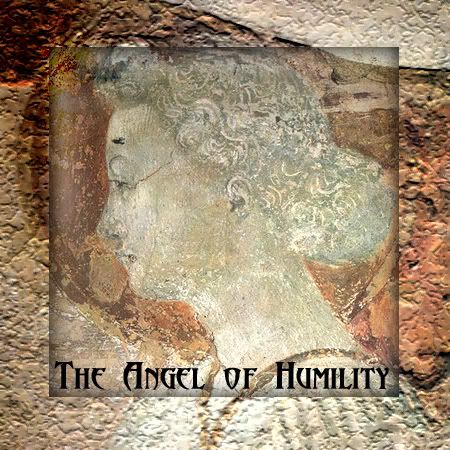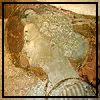
An Angel (detail), c. 1435.
Fresco, San Miniato al Monte, Florence
The Angel of Humility
by Anselm Grün
The German word for humility is “Demut†and is derived from the Old High German diomuti “willing to serveâ€. “Serving†meant in the Germanic system of fealty “being a servant, being a runner for someoneâ€. With this term the ancient Germans translated the Latin word humilitas. Thus they interpreted the Latin word in their own way. For them humility meant the courage to serve, to serve life, to stand up for others, to run for others. In this meaning lies the willingness to look beyond yourself and your needs, to free yourself of yourself, to stand up for others. But with this interpretation the biblical expression of humilitas is not yet fully grasped, but just one aspect of its meaning.
Humilitas is derived from humus, earth, ground. Humilitas means the courage to accept our own earthliness, the courage to come to terms with our truth – that we have been taken from the earth, that we are human beings of flesh and blood, with urges and vital needs. A person who does not have the courage to face this personal truth, is blind. This exemplifies the famous story of the healing of the blind in Joh 9. A person is blind from birth. Obviously he has suffered through a childhood so horrible that the only thing left to him was to close his eyes to reality. He has made up his own world in order to survive. To counter negative images that others have forced upon him, he has created a high ideal. But this ideal does not conform with his own reality. Therefore he had to close his eyes to it. Jesus heals him by spitting on the ground, on the earth, on the humus and preparing a pulp of earth with his spittle. This dirty pulp he puts on the eyes of the blind to tell them thus: “You have been taken from the earth as well. Come to terms with the dirt that is within you. Only then you will be able to see again. You need courage for the truth, for your humanity, for your own earthliness. Then you will be able to walk this world with open eyes.â€
Humility as courage for your own truth is a sign for true spirituality among monks. Who has been made presumptuous by the spiritual path, who puts herself above others who are controlled by their moods and urges, has not met her own truth yet. Hermann Hesse relates this in his book “Siddharta†in a fascinating way. There is Siddharta who at first leads a life of the most demanding asceticism, but fails in that. Then he goes out into the world and embraces all of his desires. Finally he becomes tired of this way of life and abandons the world again. At the river he suddenly experiences the great revelation. There he sees the “child menâ€, how they cross the river on their boat. Previously he would have put himself above them. But now he feels with them. He experiences a deep sense of solidarity with them. He is just like them. He feels pity for them, but also hope. He judges no one, but he knows: for all of them there is a greater love that can change everything. The Angel of Humility has taken him to task and taught him that solidarity with the people and with yourself can only be experienced if you are willing to descend to them and your own truth.
Humble persons are not persons who humiliate themselves, who shirk all challenges because they don’t feel up to them. They are not deeply afflicted persons who debase themselves in false subservience. Instead they are persons who have the courage to face their own truth and who appear modest in consequence. They know that all abysses of human character also lie within themselves. Therefore they do not judge anyone. Because they bowed down to the earth of their own truth, they can become Angels of Humility who lift up afflicted and broken people.
Humilitas also has something to do with humour. The humble has humour. She can laugh about herself. She has distance to herself. She can look at herself placidly, because she permits herself to be who she is, a human being of earth and heaven, a human being with faults and weaknesses and at the same time loveable and precious. I wish that the Angel of Humility may give you the courage to to accept and love yourself in your earthliness and humanity. Then you will inspire hope and confidence in everyone you meet. The Angel of Humility will create an area around you that enables people to find the courage to descend to their own reality and thus to ascend to true life.
© by Anselm Grün, 50 Engel für das Jahr, 1997;
translation by JunoMagic.
Song for December 4:

Erdengesang
(“Song of the Earth”)
by Hans-Jürgen Hufeisen,
album “Pegasus – Melodien der Vier Winde” (“Pegasus – Melodies of the Four Winds”)

These Advent posts are amazing. They are speaking to my heart, about the things that trouble me, the things I know I do not do well enough or often enough, the things I know are more important that the things I spend most of time worrying about.
Catholic means universal, and these truths are universal wisdom.
I love the art and music. I am making a folder of the MP3s. This is a tremendous project here. You need to save it in HTML form, an Advent e-book.
Mike
That’s what I really like about that monk. He manages to convey universal truths in words of *his* belief without being in any way patronizing. Thus his words stay *universal*.
I’ll keep that in mind about the e-book. I’m having a lot of fun with the pictures. And though my flute teacher did not like Hans-Jürgen Hufeisen (she called him a “fraud”), I enjoy his melodies very much.